
by Kasia | Aug 9, 2017 | Writing
Another quarter has flown by. Three months are done and dusted. I’ve heard people starting the countdown to Christmas which has left me a little concerned. Here in Australia, it’s also the end of the financial year so the joys of tax time have arrived.

The past three months have been exhausting, stressful and not as productive as I hoped. But when you pile a crap-load on your plate – work, parenting, study, writing a book, training for a marathon and building a house – well, it’s no surprise that shit may hit the fan, you might get run down, and well that productivity schedule might as well be scrunched up and thrown in the trash.
On the upside, Lethal Games is AVAILABLE ON AMAZON, KOBO and SMASHWORDS!
I’m excited!
It’s Book 4 in the Lexi Ryder Crime Thriller series, and I can’t wait for you to read it.
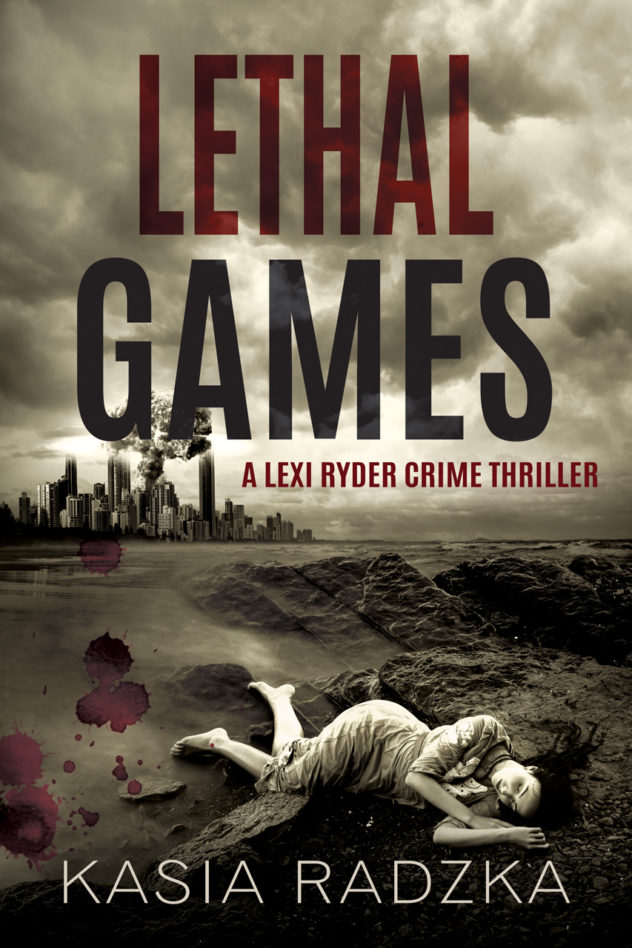
Lexi Ryder is moving on. She’s putting her life back together after the public ordeal with her family and keeping Matt happy by staying out of trouble. At least that’s what she intends for it to look like. But behind the scenes, she’s not willing to stop investigating the stories that really matter.
When her investigation finds her embroiled in a dangerous game that poses a threat to the entire country. She has no choice but to get involved, even if it means risking her life and her future with Matt.
This time Lexi is in for more than she bargained for. It’s no longer about seeking justice for one person but preventing a national disaster.
When enemies become allies, trust is a commodity hard to come by.
And there’s still Avery Stone. Will he end up being her saviour or her demise?
You can get Lethal Games from the following online book stores:
AMAZON
KOBO
SMASHWORDS
If you’ve read any of my books and enjoyed them, then please take a moment to leave a review. It’s the best ‘thanks’, you can give an author.
Given that I’m posting the update so late, I’m happy to say that I’m releasing a box-set with the four Lexi Ryder Crime Thriller books available as one package. Currently available for pre-order for only 99c. The price will be going up to $4.99 shortly. So grab yours for the low price of 99c before mid-August!
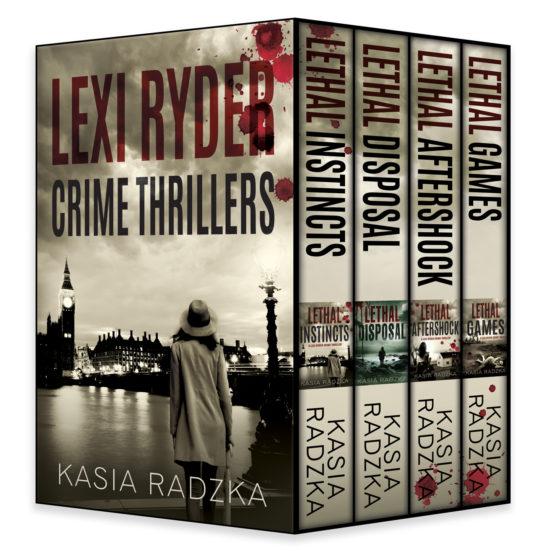
The box-set is available for pre-order for 99c until the 14 August 2017. You can get it from,
AMAZON
KOBO
SMASHWORDS
HOLIDAY FUN
I did manage a family holiday in amongst the business. It was our second time in Fiji and as expected it was fantastic minus a chest cough I had to deal with.
BOOK SALES AND GIVEAWAYS
Once again I managed to do zero marketing this quarter. I didn’t see the point in investing the time and money when I couldn’t put in a hundred percent into my efforts. No point in doing a half-assed job on it and expecting decent results.
The first book in the Lexi Ryder Crime Thriller Series is currently perma-free on Amazon, Kobo & Smashwords. You can get it here –> AMAZON , KOBO ,KOBO , SMASHWORDS.
The only marketing that I’ve done is some Twitter posting.
Lethal Instincts is getting downloaded a few times a day which is great.
Sales are a slow trickle but that’s no surprise as I’ve put no emphasis on marketing my books. This will change next quarter as I want to start building my email list and selling more books!
FREELANCING & SIDE HUSTLES
Zero. Nada Zilch.
BLOGGING
I’m working on redesigning my website. A few ideas are bobbing around in my head at the moment and I’m trying to put them together in a coherent form.
OMG, HTML, you’re a foreign language!
ON MY BOOKSHELF
I’ve set a goal to read 78 books this year. It’s been a slow start but here are some of the books that I’ve read over the past three months.
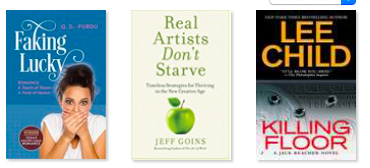
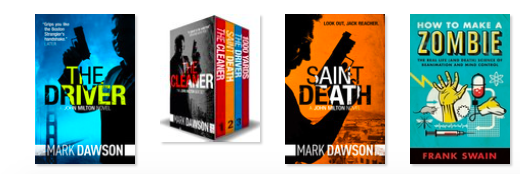

Do you have Goodreads? We should connect!
What is your definition of success?
I’ve been thinking about that the past few days. Success. How can I define what success really means?
It all depends on the day, week, month, year.
For 2017, my definition of success is evolving. At the present time, it means releasing four books.
I’m happy to say that I’m halfway there.
GOALS FOR NEXT QUARTER (JULY – SEPTEMBER)
Last quarter I set some hefty goals. They weren’t all going to get achieved. Not with my busy schedule and a million and one things to get organised. Certain activities can be mentally draining and trying to sit down after a tough day to write and continue using your brain becomes impossible. Often a run or a HIIT workout helps to push through but sometimes you just need to put your head on the pillow and sleep.
Time is a limited commodity that most of us take for granted. But if we want something bad enough, we’re going to make the time to get it done.
1 – Start being active with marketing
2 – Finish writing and editing my stand alone suspense/thriller – As Darkness Falls (working title only)
3 – Complete draft of Mystic Creek – my take on a supernatural/urban fantasy story
How’s your year travelling? Are you close to meeting your goals for the year?
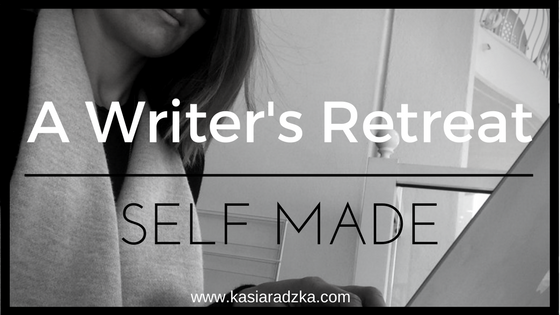
by Kasia | Jul 11, 2017 | Writing
Two days and two nights of writing, editing, and reading…and wine. What more could a writer want?
I’ve been planning a writer’s retreat for over a year now. Thinking about it. Mulling the idea over in my head. Talking about it. Then I realised:
Just do it.
When you’re a mum going away for the weekend on your own to just write seems selfish. Hell, I felt guilty. For just a moment. And whilst I missed my little munchkin like crazy, I would do it again in a heartbeat…just not tomorrow.
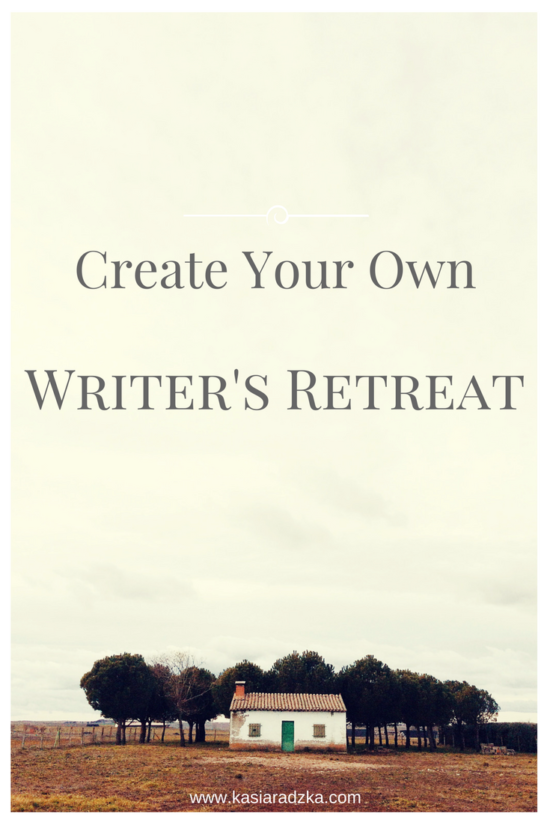
Why Bother With A Writer’s Retreat?
Our days are filled with routines and responsibilities, distractions and excuses. It’s too easy to make and break plans for your writing unless you are super strict with your prioritising.
My key writing time is on the commute to and from the day job and after my son goes to bed. But the commute is the most reliable. Weeknights are exhausting, especially after having spent two and a half hours on the train and eight hours in the office. Often, the last thing you want to be doing is turning on the computer again.
The main benefit of a writer’s retreat is the ability to focus solely on writing. You get two days where all you have to do is write, read and edit. Meals and bathroom breaks are optional but highly recommended.
When you’ve dedicated a weekend to just writing, and as in my case paid for an apartment to really getaway, you become more motivated to get shit done and ignore any urges to procrastinate.
The only thing I procrastinated about was heading to the gym before lunch. I made it after much deliberation. As a writer, you need a break to keep the creative juices flowing and you need to move your butt. Sitting is not conducive to good health or fitting into skinny jeans.
The thirty-minute run made my afternoon equally as productive as my morning.
How Do Can You Make Your Own Writer’s Retreat Work?
* Have a plan
Putting a plan in place is integral. If you don’t have your objectives set out for your writer’s retreat then you’re going in blind and more likely to, (a) procrastinate; (b) get frustrated; (c ) be less productive.
A good plan will ensure that you get shit done in a timely fashion.
I made a list of all the things I wanted to achieve before embarking on my solo writer’s retreat.
Naturally, I overestimated how much I could actually get done and didn’t really account for the planned distractions.
There’s only so long that you can be crammed into a holiday apartment. Whilst the views were great and my writing flowed, my brain needed a break.
So I booked dinner with friends on one night. It was meant to be an early night but I didn’t end up getting back to the apartment till after 11 pm which meant the chances of waking up at 5ish the following morning to go for a run, have breakfast and start writing by 7 were not going to happen.
Yes, I planned out for each hour of the day from the moment I woke up to the moment my head hit the pillow at the end of the day, which brings me to the next point.
* Be Flexible
Flexibility is a must for a writer, especially when you’ve booked yourself away and expect your muse to show up at your beck and call.
Unfortunately, the muse has a mind of its own.
Sometimes it comes freely, sometimes you need to push and pull in the direction that you want for the creative juices to start flowing.
I have three projects on the go. Which means that if one wasn’t flowing I could jump to the next one. I had the plan in place where I worked for an hour to an hour and a half on each in the morning, then repeated the process in the afternoon.
It worked for me. I got a lot done.
* No Pressure
Pressure can be a help and a hindrance.
Whilst I had a plan and flexibility I placed no pressure on myself to get everything done. I knew that all the things I planned weren’t going to be achieved. There’s only so much you can do in two days.
Your brain will need a break. Whether that’s after an hour or eight hours will depend on you and your habits.
I can sometimes work for hours straight. Then there are days that I can’t hold my attention on one thing for more than ten minutes.
Using a timer for each task helped stay focused and relieved the pressure.
I wasn’t strict with it though. If the words were flowing I’d continue for a little bit longer.
* Treat yourself
Buy your favourite bottle of wine or organise to go out to a nice restaurant in the evening as a reward for the hard work that you’ve put in. You deserve it.
For each task you complete, give yourself a mini reward. It could be as simple as refilling your coffee cup or taking a break for lunch.
Or get creative and reward yourself with a new book from Amazon, a quick dance around the living room, or the time to watch an episode of your favourite tv series.
* Dress nicely
Avoid the tracksuit and jumper.
You want to feel good when you write.
Stepping out for breakfast before your writing day starts will help you make the effort. It’s well worth it.
I don’t know about you, but I get little done in my tracksuit unless it involves cleaning or working out.
* Have fun
Fun is important here. This is your weekend. You’re doing watch you love without interruption unless you want it.
Make it what you want it to be.
Grab a book that you’ve wanted to read. Play music. Watch a movie. Listen to a podcast.
Enjoy the process and the experience.
* Lose The Internet Connection
The internet is a time waster. It’s so easy to search for a word or piece of research only to find that an hour has passed because you couldn’t help yourself but check all your social media accounts and get lost in conversation about the differences between the comma and full stop. Ok, I’m sure you’re talking about more riveting stuff than that.
But the internet will kill your productivity.
I was glad there was no free wifi where I was staying. The only internet connection was on my phone. I used it for about half an hour during my stay.
It was awesome.
What Can You Do During Your Writer’s Retreat?
A writer’s retreat is filled with endless possibilities. You can focus on just the writing, or just editing or a combination of the two. I’m certain you’ll include reading in there too, you are a writer after all.
* Play catch up
Is there a project that you’re running behind on? Focus on catching up to where you want to be. Set the timer for an hour and get as much done as possible.
It’s amazing how much you can get done in sixty minutes.
* Get out of your comfort zone
Bring some writing exercises and take a few minutes here and there to challenge your writing muscles.
Focus on your weaknesses and you never know, they might just become your strengths by the end of the weekend.
* Set a word limit
Have you ever wondered how some writers manage an output of 5,000 or even 10,000 words in a day?
Yeah, I wish I could do that too.
Your writer’s retreat is the perfect time to challenge those writing muscles and aim high.
How many words can you write in an hour? If the words are flowing then I can write anywhere between 1500-2000 words. If they’re not, then it’s more like 500-1000.
So in an eight hour day, I could write between 4,000 and 16,000 words.
Hahaha, yes, I’m laughing too.
With that range, 10,000 would be an achievable goal to write in one day, or over course of the weekend.
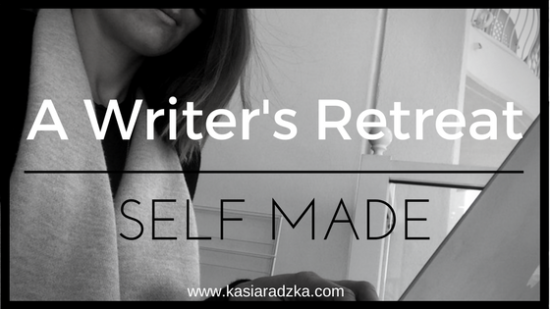
What Worked, What Didn’t, & What I’d Do Different
I loved my solo writer’s retreat and I’m so glad I did it. It was productive, relaxing and fun.
Whilst I didn’t get everything done – there aren’t enough hours in the day! I got the most important things done, including:
* Finished the proofs on my new book, Lethal Games.
* Rewrote about 10,000 words in a standalone thriller I’m working on
* Wrote a long world building chapter for my urban fantasy novel
* Drafted and edited two blog posts
* Started reading How To Market A Book (Third Edition) by Joanna Penn
* Watched zero television
* Caught up with friends I hadn’t seen in ages
* Relaxed more than I thought I would
Having a plan whilst being flexible with the weekend worked well. I knew what I wanted to achieve and I got it done.
Breaking down the day into chunks was effective too. I didn’t have a chance to burn out with one story because I was changing project focus every 60 to 90 minutes.
The only other thing I’d have done different is not to plan any social catch ups in the evenings. It was nice and it did break up the monotony of working but it also ate into the time that I had to focus on writing.
I’m definitely going to do this again.
A solo writers’ retreat is a great way to jump start your writing or reignite the writing flame.
I only wish I’d done it sooner.
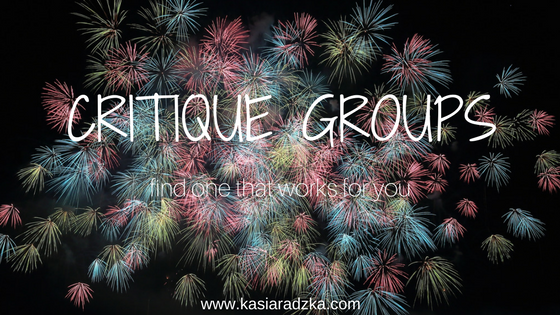
by Kasia | Jun 15, 2017 | Writing
A critique group.
My first thought was, “Hell yeah, let’s do it.”
Then my other half of the brain caught up and said, “What the fuck are you thinking?”
Critique groups aren’t for everyone. Before joining one, I heard rumours.
Some were full of praise. Others warned me off them.
Did I really want someone with about the same experience as I to tell me how I should write my story?

Now, I’m all for editors and beta readers. They are necessary to produce a good quality novel. No argument there. You need them no matter how wonderful your prose is because guaranteed, a reader will find an error.
But a critique group comes long before you read editor and beta reader stage.
Fellow members of your group are likely to see your raw material. Material that hasn’t had the luxury of editing and proofreading.
And that’s dangerous.
Especially, if you’re one of those individuals who take everything to heart.
You know, that as a writer you’re not going to please everyone. You might get raving reviews, and you might even encounter the nasty and vicious ones.
They will make you feel like shit.
It’s ok. Acknowledge them and move on.
Better yet, don’t read them.
Reviews are a waste of your time and energy. They’re subjective.
Check out your favourite authors, bestselling authors, award winners. I guarantee that you will find a malicious review.
And that’s for an already edited, proofread and finished product.
If you don’t want to ever get a bad review, save yourself the heartache, and don’t publish your writing.
FYI: Reading reviews is a waste of time, some will boost your ego, others will defeat it. But your book does need reviews to sell. Those reviews are for your potential readers, not you.
Your critique group isn’t going to see your best efforts. It’s going to see your first or second efforts. Drafts that still need to go through heavy editing and proofreading.
They are going to judge your raw writing, the bare bones of your story.
This has pros and cons.
You can get an idea whether your story is heading in the right direction. Or, you might be so influenced by the comments and suggestions that you lose your author voice.
While I haven’t been part of a critique group for long, I have found the following tips to be useful.
11 THINGS TO CONSIDER FOR A SUCCESSFUL CRITIQUE GROUP
- Mutual respect. You need to respect the members of the group and they have to respect you. The last thing you want is a group filled with vindictive personalities.
- Be willing to accept criticism. Everyone is entitled to their opinion. While I’ve grown up to believe that if you have nothing nice to say, don’t say anything at all. Unfortunately, when your critiquing or getting critiquing there are going to be things that you don’t want to hear.
- Always enter the critique session with an open mind and zero arguments. You’re not there to fight for your story. You are there to learn and to improve your writing
- So listen. Listen to the comments. Is there a pattern emerging? Are multiple people saying the same thing? Are there mixed opinions? You’ll find that both may occur.
- Take emotions out of the equation. Don’t get upset when someone doesn’t like a bit of dialogue or too much description. Nor should you jump for join when the group tells you that you’ve written a fabulous story. Stay level headed and take it all in.
- Decide what advice to use and which to discard. In the end, it’s your book, you have to enjoy writing it and you have to be happy with the finished product.
- The people in your group should enjoy a similar genre. No point in getting someone who only readers sci-fi thrillers to critique your historical romance.
- Use the sandwich approach when giving a critique. Compliment, critique, compliment. It’s much easier to handle a negative comment when there’s a positive one on either side.
- Set the ground rules for your critique group from the start. You want everyone to agree with the expectations set out for them.
- A critique group is a work in progress. It’s trial and error. You’ll find that with each session you’re going to come to a schedule and format that works for all members involved.
- Remember to have fun and enjoy the process.
Happy Writing!

by Kasia | Jun 14, 2017 | Writing
I love a good superhero movie. The good guys battle evil, they overcome a few obstacles, hit a dead-end, battle some more and end up coming out on top.
They’re fun, entertaining and playful.
Two hours of shutting off my brain and suspending all disbelief is a perfect way to relax.
So if anyone tells me that a superhero movie is (a) over the top, or (b) not realistic enough, I’m not going to be considerate with my language.
It’s a superhero movie, there’s nothing realistic about a caped crusader afraid of bats, or a boy shooting spider webs from his palms, a man flying around in tights and allergic to kryptonite, or a woman with bullet proof bracelets that’s lived for millennia, or a talking tree as sidekick to a racoon.
I do not go into a movie like that expecting realism. I expect fun and entertainment and shit getting blown up. The same as when I read a book.

Last weekend, I went to the cinema to see Wonder Woman. It’s a movie that needs to be seen on the big screen.
I had high expectations of Wonder Woman. Very high.
The media put out a lot of hype about the movie and how epic it was supposed to be. I have to admit, I was concerned that I’d be disappointed. And I did not want this movie to disappoint. I wanted to be impressed from start to the closing credits.
I’m happy to say that Wonder Woman surpassed my expectations.
It’s was probably one of the best, if not the best, superhero movies I’ve seen to date.
Wonder Woman is an origin story about Diana Prince, an Amazonian living on an island occupied only by women warriors who are trained to protect the world. They are beautiful, bright, and brutal when necessary. When the war literally knocks on their doorstep when Steve a WWI soldier crash lands his plane into the sea near the island, Diana, aka Wonder Woman, gets her call to action. She follows him into the world and we see her grow from an innocently naive woman to a confident, graceful and empathetic warrior, hell-bent on protecting the world from the God of War.
It made me laugh, smile, cry, and cheer for the good guy. In parts I felt the despair, fear and pain along with the characters.
Most importantly Wonder Woman was an empathetic and sympathetic character.
The kind of character that young woman today need to look up. Strong woman who strive for fairness, peace and integrity. Women who are capable of standing up to themselves whilst being graceful and kind, but also fierce when duty calls.
Emotion is a powerful element of creating powerful stories that resonate with readers (or viewers). The scenes that invoke the desired emotions can often be the hardest to write.
The more emotions we can invoke in our writing the more successful we will be.
Different genres will aim for different emotions but a little bit of humour to a serious moment in a suspense story can offer a breather and put your reader off guard so that when the next frightening moment appears it will seem more thrilling.
When you’re writing, what emotions do you want to invoke in your readers?
How can you convey the scene so that reader will feel what you’ve intended?
I’d like to give you a clear-cut answer to that but I just don’t know. Each story is different. Each writer is different.
But I do know one thing. You need to practice.
Practice with your scenes, your characters, your dialogue.
Show more, tell less.
The only emotion you’re going to invoke by telling is boredom and that’s the last thing you want to do when you’re writing for an audience. You’ll get to a point where you’ll even bore yourself. Then you know there’s definitely a problem.
I would love to one day create a character that is as emotionally engaging as Wonder Woman. With practice and perseverance, anything is possible.
Here’s a little exercise to get your creativity brewing and help you practice writing by focusing on showing instead of telling.
WRITING EXERCISE: SHOW, DON’T TELL
Write a scene portraying the following emotions and characters. Show don’t tell. Your reader wants a picture not a summary. 🙂
A happy child
A grieving widow
A love-sick teenager
The terrors of war
A relieved father
A revenge driven nun
A bored doctor
A wicked housewife
What would these people do? How would these people act? What could happen to turn the emotion to their polar opposite? Aim to write a scene that’s 100-500 words. See what develops. You might be surprised and meet a character perfect for your story.
Example
Beth stood by the kitchen bench, facing the window out to the neighbours backyard, her fingers tapping against the marble.
One. Two. Three. Four.
One. Two. Three. Four.
Outside, the toddler ran along the freshly mowed grass, falling over and leaving a green stain on his light khaki trousers. The woman scowled. Another pair meant for the trash. The man with the toddler just picked him up and threw him up in the air before catching him and squeezing him tight in a big hug. She saw them laugh, and the toddler was back on the ground chasing the soccer ball around.
Moving away from the window, she untied the apron from around her waist and hung it in its rightful spot inside the walk in pantry. She let her hand settle over her stomach for a few moments as she stood there wondering of what might have been.
But it was no use thinking back to the past so instead she looked at the pantry and grimaced at the sight. The sterile whiteness, bland and boring. Toaster, microwave, even the cans of tomatoes neatly stacked, each item with the designated spot that could not be altered.
She lingered a minute longer wondering how in the hell did she end up in that house spending her days slaving away in the kitchen, watching from a distance a life that could have been hers. At what point had she made the decision to be someone else? To forfeit her hopes and dreams.
But enough was enough.
Beth walked into the pantry, standing on her tiptoes she reached above to the back of the top shelve, pulling out a tiny vial hidden behind a packet of corn flakes, she smiled and allowed herself to daydream for just a moment about all the possibilites that were about to present themselves.
Now it’s your turn. Show don’t tell. Feel free to share in the comments.

by Kasia | Jun 13, 2017 | Writing
Perfection – it’s overrated. Often even paralysing.
It’s futile to your productivity and your progress.
Aiming for perfection stops us from finishings things. It stops us from putting out our ideas into the world to be enjoyed by others.
Creatives are often perfectionists.
If it’s not perfect, it often stays hidden in the depths of their documents or in notebooks stashed in the back of cupboards. Lonely, neglected and forgotten.
But perfection is subjective.
To us, a piece of work is never really going to be finished. It can always be improved, modifying, edited, tweaked.
Writers are often their worst self-critic.

It’s so easy to spend hours, days, weeks, even months editing a chapter aiming for perfection but never being happy with it. There comes a point where you have to say enough is enough.
Your work has to be good enough because ‘perfect’ is subjective and whilst one person might love it, another could hate it. Have you seen some of the reviews for the first Lee Child book? Even he can’t please every reader.
There comes a point where you have to be honest with yourself and make a decision to finish. Then to share it with the world. Then move on to the next project and never look back.
Just aim for each article, each blog post, each novel to be better than the one that came before it. Learn from your mistakes, improve your techniques, work on your weaknesses, highlight your strengths.
Perfection is an obstacle that prevents creatives from achieving their dreams. Quality is important but quantity is too.
It’s so hard to stand out in the world today that we as writers, authors, creatives, require a multitude of products on the market to be noticed and to make a living.
That’s not to say we put out crap without an ounce of editing, or create a cover design with zero designer skills. We hire professionals to help us with these things.
We write our best work. We self-edit. Proofread. Then hand it over to the pros.
Next, we proofread again.
Finally, we let go of our pride and joy, forget it, and start over with another idea.
You need to make a decision about your process, mould it to suit your schedule and your needs.
11 QUICK STEPS I USE TO GETTING THE NOVEL WRITTEN
1. Brainstorm your story.
2. Write the first draft.
3. Tweak the story line and subplots;
4. Make sure all the questions posed are answered.
5. Tie up any loose ends.
6. Proofread for grammar, spelling, and punctuation.
7. Hire an editor.
8. Hire a cover designer.
9. Get it formatted (or use Vellum).
10.Hit publish.
11. Start again.
An easy process. But you do need a process otherwise you end up going over and over your manuscript, never finishing. Never moving on.
We all need to move on. Move forwards and stop being stuck in one place regardless of what we are doing. It is the only way that we are going to grow into the writers we dream to be.
An essential aspect of creativity is not being afraid to fail.
– Dr. Edwin Land


















